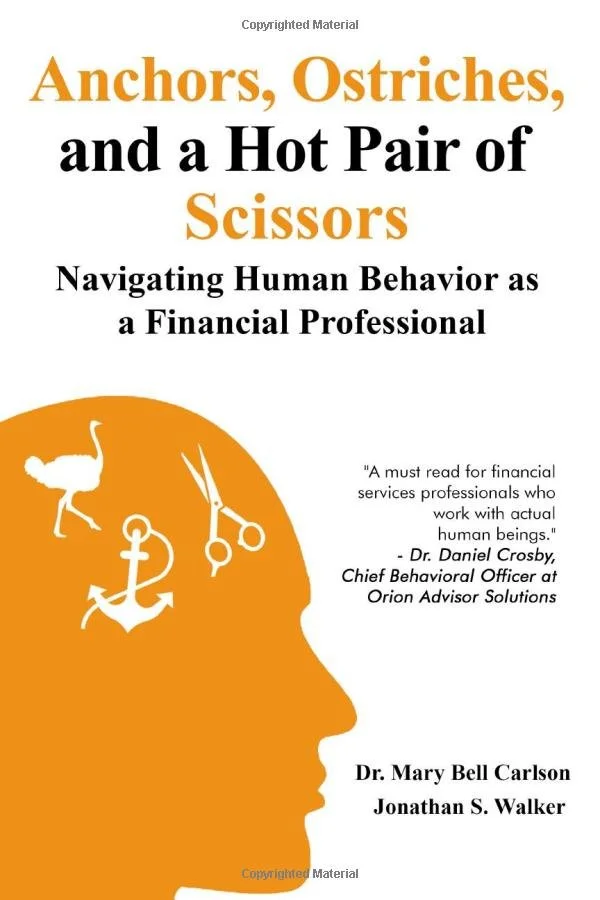Excerpt from Anchors, Ostriches, and a Hot Pair of Scissors: Navigating Human Behavior as a Financial Professional
People aren't machines. Their problems can be complicated, confusing, contradictory, and stubbornly irrational.
The financial profession is ever-changing. More and more, the value of financial planning comes from not knowing the technical side of finances but is required more and more to help clients realize their needs, hopes, and goals and help achieve them. Humans are a "messy business," but this can be seen more clearly by appreciating and understanding human nature. Using behavioral economics as a guide to show the biases people use to make unusual and predictable financial mistakes.
The following is an excerpt from the book Anchors, Ostriches, and a Hot Pair of Scissors: Navigating Human Behavior as a Financial Professional by Dr. Mary Bell Carlson and Jonathan Walker.
At the height of the global war on terror, the military installation buzzed with activity. A steady stream of deployments kept the installation on a high op-tempo with almost no rest between each successive wave. General John Pershing once said that infantry wins battles, but logistics wins wars. So, the officers focused on execution and efficiency.
War is, after all, an extremely complicated business. Catastrophic failures can emerge from the details. Leaders couldn’t afford to overlook anything. In one of the many risk assessment meetings, a full-bird colonel led a group to scrutinize anything that could disrupt the efficiency of the installation’s operations.
One statistic stood out more than any other: the financial problems of the rank and file. “I want this fixed, NOW!” the colonel demanded of the participants around the table. The colonel could see how uncertainty in a soldier’s personal finances could lead to distraction and poor performance. "If I had a tank that broke, you'd get in under the hood and get it fixed. I want the same thing done with these soldiers. Fix their financial problems."
If only it were that easy.
People aren't machines. Their problems can be complicated, confusing, contradictory, and stubbornly irrational. You can't just assign a remarkably talented quartermaster to fix a troublesome depot or identify a faulty part in a sputtering engine.
The solution to many people's financial troubles lies within the individual. People know their own lives, challenges, needs, and goals. They hold the keys to their success, just as their flaws stand in the way of that success.
Role of the Advisor
So, what role should a financial advisor, planner, or coach play? If they aren’t mechanics looking to replace spare parts, what are they? How can they support their client's success? How do they need to approach their clients’ problems?
Rather than a mechanic with a wrench, the better metaphor might be a walking companion: someone standing next to a client, watching the horizon, warning of pitfalls, and helping them decide which path to take.
Help-givers build their relationships on a foundation of trust. The field of psychology has long understood that the relationship between the therapist and the client predicts the chance of the client’s success.
This is undoubtedly true of any advisory role. Why? Because we're humans and not machines. Relationships need trust, confidence, and assurance before a client will accept advice, follow recommendations, and seek information. Personal finance demands high levels of trust because the issues are complicated, deeply personal, and will impact people’s long-term lives.
So, what does this mean for you? Do you need to send more boxes of chocolates for the holidays or make more time for lunches with clients? Not necessarily. Instead, clients need to be heard and understood. Whether you understand their goals and how you integrate their values into their plans, how you listen to them will build that trusting relationship.
Human beings don’t have separate rational brains and emotional brains that act independently of each other. Emotions play an important role in analytical decisions. How clients feel about their financial situations can affect their behavior more than the technical information you give them.
Financial professionals must understand how people think and react to uncertainty and when they are liable to make a mistake in judgment. That sounds like a tall order! How can we be expected to be financial professionals and psychologists? Fortunately, psychologists have learned much about human logic in the last fifty years.
